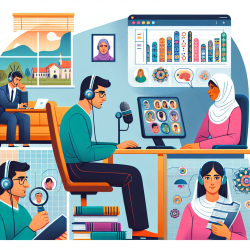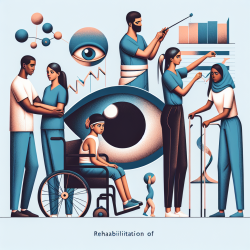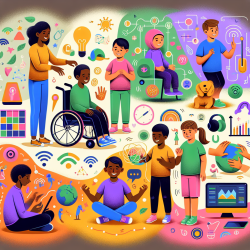As a Special Education Director, you are likely well aware of the challenges faced by students with aphasia. Aphasia, a condition affecting the ability to communicate, can be particularly debilitating, impacting not just the student but also their family and educational experience. Recent research, such as the study titled "Modality Effects on Aphasic Naming Performance," offers valuable insights that can help practitioners like you enhance their skills and provide more effective support to students with aphasia.
In this blog, we will delve into the key findings of this research and explore practical ways to implement these outcomes in your educational setting. Whether you are a seasoned professional or new to the field, these insights will encourage you to refine your approach or even inspire further research.
Understanding the Research
The study "Modality Effects on Aphasic Naming Performance" examines how different modalities—such as visual, auditory, and tactile—affect the naming performance of individuals with aphasia. The key takeaway from this research is that the modality through which information is presented can significantly impact the ability of aphasic individuals to name objects correctly.
Here are some of the main findings:
- Visual Modality: Visual aids, such as pictures or written words, can significantly enhance naming performance. This is particularly useful for individuals who have retained their visual processing abilities.
- Auditory Modality: Auditory cues, like spoken words or sounds, can also be effective, especially for those who respond well to verbal instructions.
- Tactile Modality: Tactile methods, such as using physical objects, can be beneficial for individuals who have stronger tactile processing skills.
Implementing Research Outcomes
Based on these findings, here are some practical steps you can take to improve the naming performance of students with aphasia:
1. Multi-Modality Approach
Incorporate multiple modalities in your therapy sessions. For example, when teaching a student to name an object, you could show a picture of the object (visual), say the name of the object (auditory), and let the student touch or hold the object (tactile). This multi-modality approach can cater to the student's strengths and provide a more comprehensive learning experience.
2. Personalized Therapy Plans
Each student with aphasia is unique, and their response to different modalities can vary. Conduct assessments to determine which modality or combination of modalities works best for each student. Tailor your therapy plans accordingly to maximize their naming performance.
3. Use of Technology
Leverage technology to provide varied modalities. For instance, use apps that combine visual, auditory, and tactile elements to engage students in naming exercises. Online therapy platforms like TinyEYE can be particularly useful in delivering these multi-modal interventions effectively.
4. Continuous Monitoring and Adjustment
Regularly monitor the progress of your students and adjust your methods as needed. What works today might not be as effective tomorrow, so be flexible and willing to adapt your approach based on ongoing assessments and feedback.
Encouraging Further Research
While the findings from "Modality Effects on Aphasic Naming Performance" are promising, the field of aphasia therapy is ever-evolving. Encourage your team to stay updated with the latest research by attending conferences, reading relevant publications, and participating in webinars. Networking with other professionals in the field can also provide new insights and innovative strategies to implement in your practice.
Additionally, consider conducting your own research to explore the efficacy of different modalities in your specific educational setting. Share your findings with the broader community to contribute to the collective knowledge and improve aphasia therapy practices worldwide.
Conclusion
The study "Modality Effects on Aphasic Naming Performance" offers valuable insights that can significantly enhance the naming performance of students with aphasia. By implementing a multi-modality approach, personalizing therapy plans, leveraging technology, and continuously monitoring progress, you can provide more effective support to your students.
To read the original research paper, please follow this link: Modality Effects on Aphasic Naming Performance










